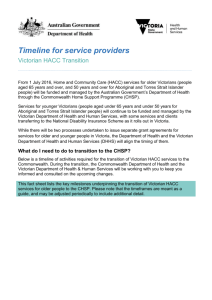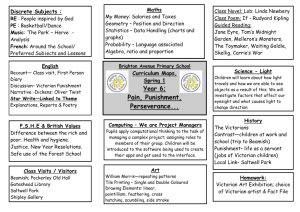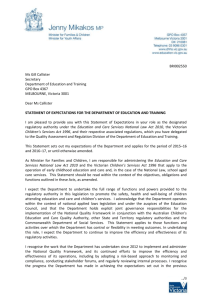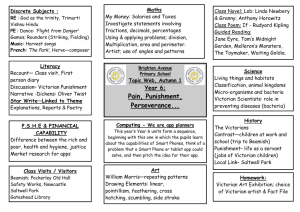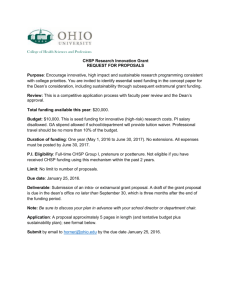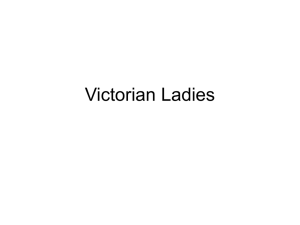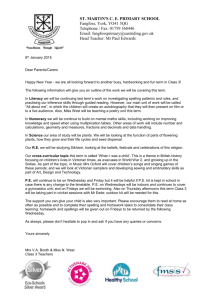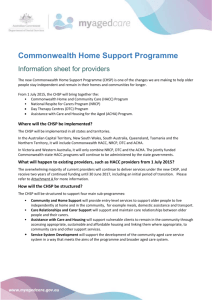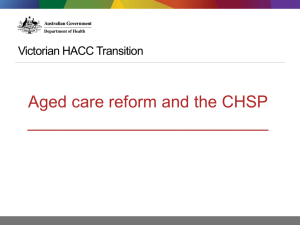Timeline for service providers
advertisement
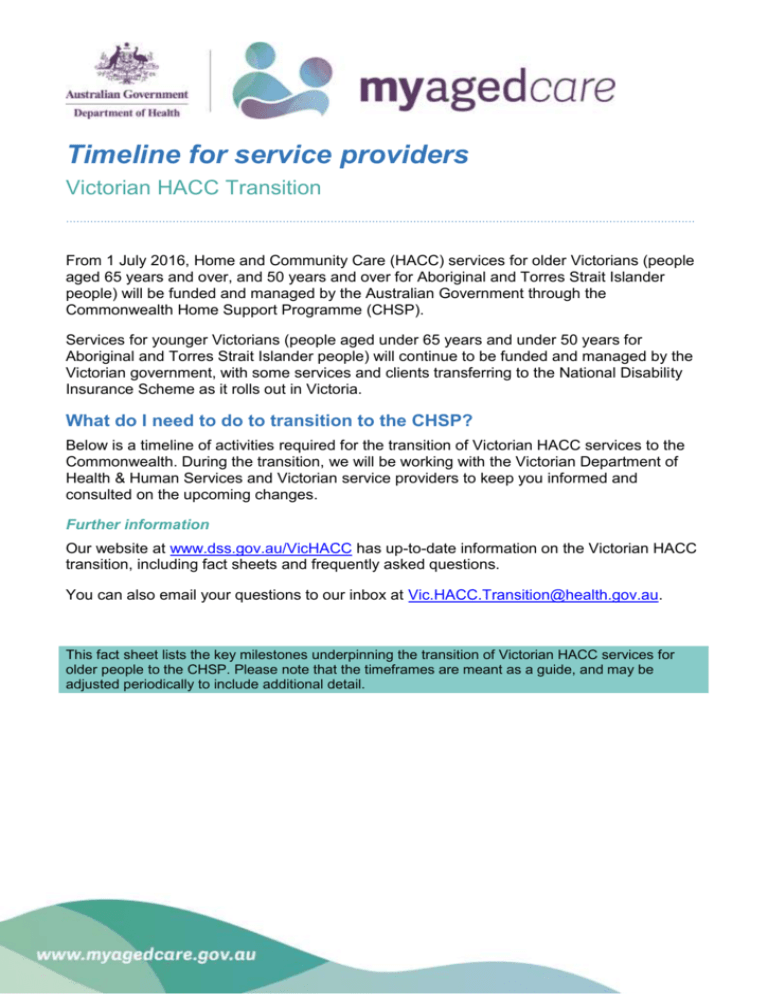
Timeline for service providers Victorian HACC Transition ………………………………………………………………………………………………………………………………………………………………… From 1 July 2016, Home and Community Care (HACC) services for older Victorians (people aged 65 years and over, and 50 years and over for Aboriginal and Torres Strait Islander people) will be funded and managed by the Australian Government through the Commonwealth Home Support Programme (CHSP). Services for younger Victorians (people aged under 65 years and under 50 years for Aboriginal and Torres Strait Islander people) will continue to be funded and managed by the Victorian government, with some services and clients transferring to the National Disability Insurance Scheme as it rolls out in Victoria. What do I need to do to transition to the CHSP? Below is a timeline of activities required for the transition of Victorian HACC services to the Commonwealth. During the transition, we will be working with the Victorian Department of Health & Human Services and Victorian service providers to keep you informed and consulted on the upcoming changes. Further information Our website at www.dss.gov.au/VicHACC has up-to-date information on the Victorian HACC transition, including fact sheets and frequently asked questions. You can also email your questions to our inbox at Vic.HACC.Transition@health.gov.au. This fact sheet lists the key milestones underpinning the transition of Victorian HACC services for older people to the CHSP. Please note that the timeframes are meant as a guide, and may be adjusted periodically to include additional detail. What is happening? November – December 2015 Joint Commonwealth and Victorian Service provider consultations December 2015 - February 2016 Proposed funding split letters sent to providers The Australian and Victorian governments will conduct a process to determine an indicative split of your HACC funding, largely based on the age profile of your clients from your data in the HACC Minimum Data Set (MDS). We will write to you seeking your acceptance of these details. What do providers need to do? Service providers are encouraged to attend the consultations to receive detailed information about the transition. Carefully review the information in the letter to determine whether the split of funding and mapping to the CHSP reflects your service delivery. You will need to accept the proposed split or suggest a variation, supported by evidence, to the information in the response. The Commonwealth Department of Health and the Victorian DHHS will discuss with you any concerns or variations requested to the split of funding and mapping in the letter. Mapping services to the CHSP Victorian HACC services will be mapped to the new CHSP service type structure. April – May 2016 Joint Commonwealth and Victorian Service provider consultations April – June 2016 Letters of offer – CHSP grant agreements Victorian DHHS will provide advice on the variation to your current DHHS service agreement Service providers are encouraged to attend these consultations as the Department will provide further information on the transition and important information about the new grant arrangements. The Victorian DHHS will provide more information on arrangements for the Victorian under 65 program. Your organisation’s relevant authorities need to be available to sign the new grant agreements. Send back your signed agreement by the date listed in your letter of offer. Talk to your Grant Agreement Manager if you have any issues or concerns about completing this activity for your CHSP grant agreement or your Victorian DHHS program and Service adviser for under 65 services . What is happening? April – June 2016 What do providers need to do? A range of resources will be available to help you and your organisation prepare for My Aged Care, including: Prepare service providers to use My Aged Care and the provider portal Fact sheets; User guides for the My Aged Care provider Portal; Videos and webinars; and Helplines. More information will be available in February/March 2016. If you would like to get a head start in terms of familiarising yourself with some of the processes, there are a range of materials available at www.dss.gov.au/Myagedcare. Please note, these resources are aligned to the national model of My Aged Care. 1 July 2016 Comply with the requirements outlined in your grant agreement and supporting documents, including the CHSP Manual and Guidelines. If service providers are directly approached by people seeking Commonwealth funded aged care services, service providers should refer clients to My Aged Care. My Aged Care contact centre staff will then facilitate registration which creates a client record. My Aged Care contact centre staff will ask a series of questions to understand the client’s needs, and send referrals for assessment and/or service(s), as required. Service providers can assist clients with the My Aged Care registration process by: Changes take effect Providers must comply with all requirements of the CHSP outlined in the suite of documents that comprise the Grant Agreement. Clients will be assessed and referred to CHSP services (delivered by those service providers who have set up their organisation in the My Aged Care provider portal) via an initial phone-based screening by the My Aged Care contact centre and a face-to-face assessment. Victorian DHHS funding agreement changed to reflect provision of services for the under 65 program Recording client details in an inbound referral form (accessed from www.myagedcare.gov.au) that is sent to the My Aged Care contact centre Calling the My Aged Care contact centre with the person to facilitate registration and screening Sending a fax with information about the person. In cases where it is apparent that urgent care is required, service delivery may be provided before a client has contacted My Aged Care. Ultimately clients need to be registered with My Aged Care, and have their broader needs considered. For more information visit www.dss.gov.au/MyAgedCare
